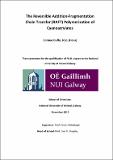The Reversible Addition-Fragmentation Chain Transfer (RAFT) polymerization of cyanoacrylates

View/
Date
2018-02-02Author
Duffy, Cormac
Metadata
Show full item recordUsage
This item's downloads: 454 (view details)
Abstract
Alkyl 2-cyanoacrylates (CAs) are primarily used as instant adhesives, including those sold under the Loctite brand.
The adhesive action can be inhibited with acid stabilisers allowing radical polymerization to be employed. This thesis details the first attempted controlled/living radical polymerization of alkyl CAs: Reversible addition fragmentation
chain transfer (RAFT) polymerization mediated by a poly(methyl methacrylate) dithiobenzoate macroRAFT agent for
three different CA monomers (ethyl 2-cyanoacrylate, n-butyl 2-cyanoacrylate, and 2-phenylethyl cyanoacrylate) allowed the
preparation of the first block copolymers of this challenging but commercially important monomer class. Nevertheless,
GPC with UV detection indicated significant loss of the RAFT end-group for all three CAs limiting control/living character.

